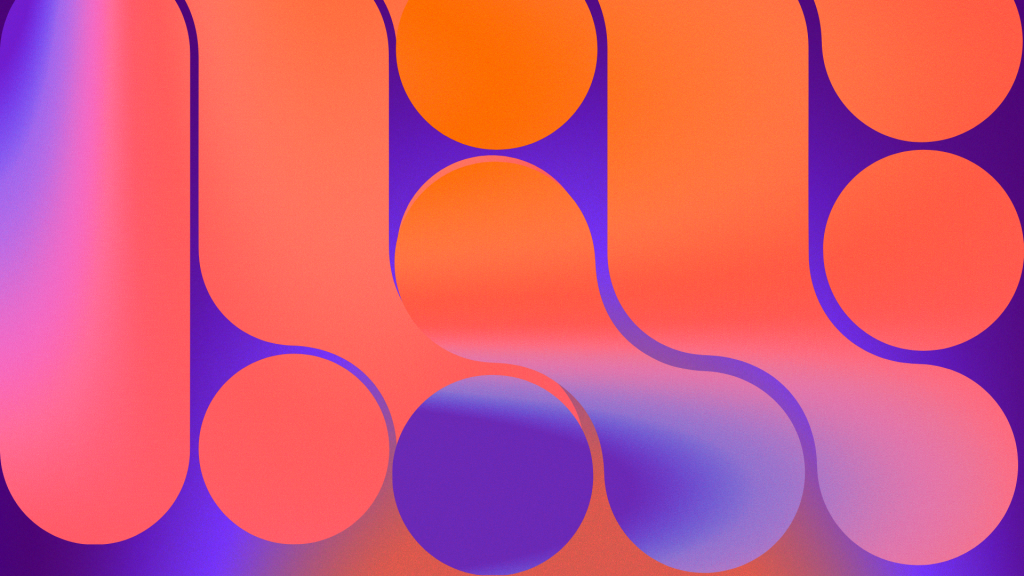S+T+ARTS Regional Centres: Repairing the present
12 Regional S+T+ARTS Centers from 11 different countries have set out to address the unintended consequences of steadfast technological development contributing to the European continent’s present social, economic, and environmental challenges.
To repair the present, the EU’s economy must be transformed and adapted for the sustainable future we all want. The Regional S+T+ARTS Centers focus on a resource, urban, ICT & art-driven transformation as the path towards reconfiguring the current social, cultural and economic landscape.
We believe this reconfiguration can only be done with the involvement of different perspectives and by tapping into artists’ potential to act as catalysts for change and actively contribute to innovation. We propose shifting the role of artists from that of observers and critics of societal contexts into that of active participants in the reimagination and building of possible futures. With Repairing the Present, we want to create the frameworks needed for this shift.
As a first step, each Regional S+T+ARTS Center has gathered a group of local experts and together defined 21 challenges in their localities. The 21 challenges have been informed by the EU Green Deal, the New European Bauhaus and the UN’s Sustainable Development Goals to reflect pan-European or global issues that nonetheless, require a focus on local regions.
We now call for international artists to join in coming up with solutions to these challenges in 21 artist fellowships. The fellowships will encourage artists to critique the present, explore beyond its current limitations and reimagine sustainable futures.
We seek artists with a strong motivation to help change behaviours, reduce waste, fight climate change, improve energy efficiency or make cities and communities more sustainable – in essence, a motivation to challenge existing actions and propose more responsible and sustainable ones. Besides the motivation, artists should have proven experience working with technologies (with a focus on ICT technologies) and integrating them into their artistic practice.
Repairing the Present is a European project which has received funding from the European Commission’s Directorate-General for Communications Networks, Content and Technology under grant agreement LC01641664.
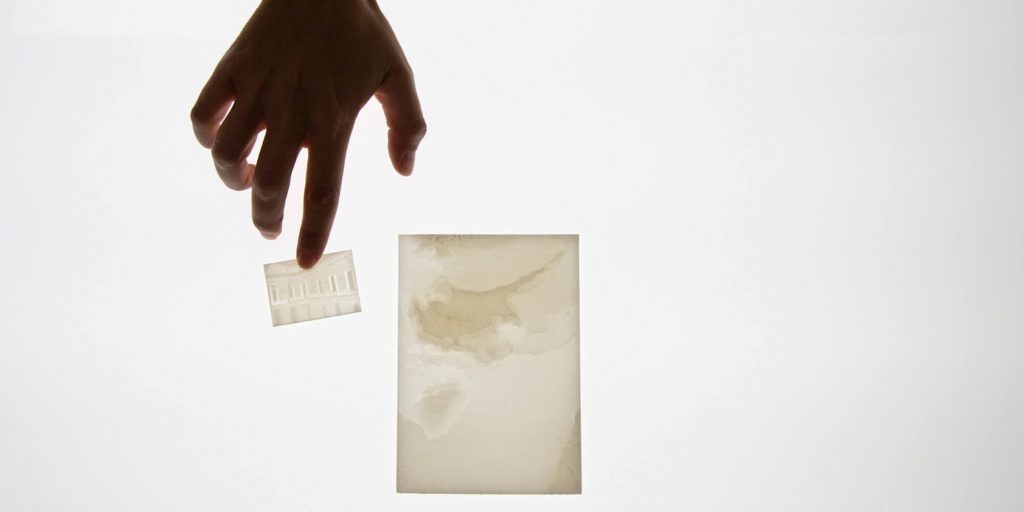
Who can apply?
The call is open to professional individual artists and collectives from any art-related field, excited and ready to collaborate with a network of experts and technology (ICT) professionals in addressing local challenges. Previous experience in collaboration with industrial companies and/or research institutions will be valued, but is not a condition for participation.
Throughout the fellowships, artists are expected to engage with regional issues, local communities and local expert groups to expand their role in society and integrate their artistic practice with the development process of innovative solutions. The goal of the proposals should be the development of a thought-provoking hybrid between an artwork and a prototype that seamlessly bridges between art and technology and proposes a solution with both functional and artistic value to a real-life issue. Furthermore, artists should aim to break the old dichotomies between autonomous and applied art and create space for novel approaches.
What do we offer?
- Up to EUR 40.000 budget for artist fellowships to cover the artist fee and other fellowship-related costs (including but not limited to artwork/prototype production, transportation to joint Prototyping Park exhibitions, travel and accommodation expenses, insurance)
- Access to the regional fellowship host organisation and local expert group
- Access to the Europe-wide S+T+ARTS network
- Access to new technologies and R&D departments
- Participation in Prototyping Parks showcasing the outcomes of the fellowships at MAXXI Rome, ZKM Karlsruhe, as well as at regional locations of the Regional S+T+ARTS Centers upon selection
- Visibility through high impact communication activities to promote the artistic output and its innovation spillovers (including dissemination events foreseen from July-December 2022)
Timeline
Fellowship: February 2022 – August 2022
Exhibiting & Impact Dissemination: September 2022- December 2022
Budget per challenge: € 40.000
Regional S+T+ARTS Centres: Snowball (Coord., BE), MAXXI Museum (IT), Art Hub Copenhagen (DK), STATE (DE), Onassis Stegi (EL), In4Art (NL), MEET (IT), CCCB (ES), Ars Electronica (AT), SONY CSL Lab (FR), Kersnikova (SI), CYENS Centre of Excellence (CY).
For more information about the eligibility criteria, please read our Guide for Applicants and FAQs
Please submit your applications exclusively via our online application platform. The application must be written in English.
Artists can apply for up to 3 challenges. Artists are only eligible for one fellowship. In the case that one artist is shortlisted for multiple fellowships, they will only be invited to present the challenge proposal prioritized in their application in front of the jury.
If you want to gain a better understanding of the application process, you can download the application form here.
Open call Timeline
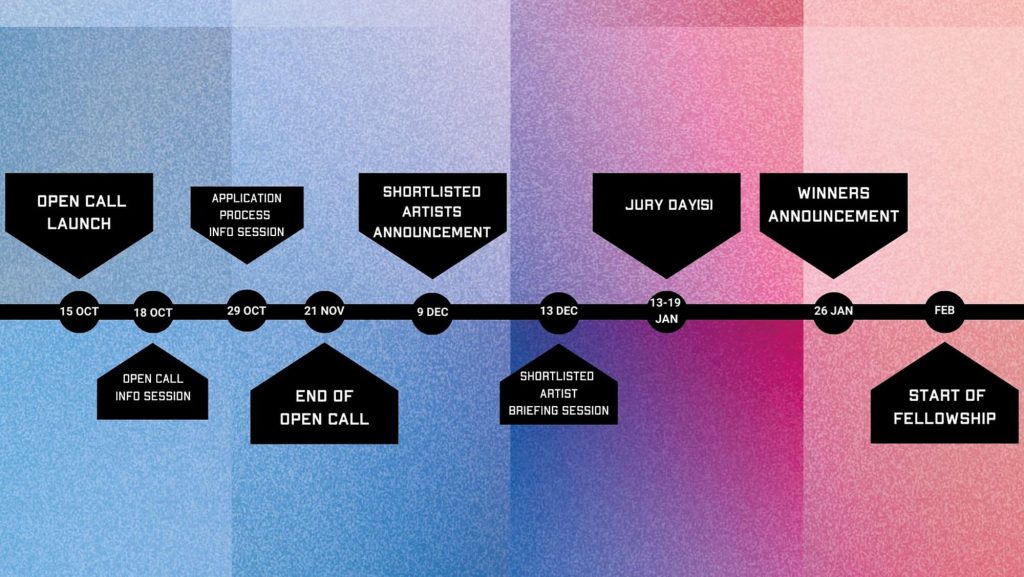
Regional challenges
Each regional challenge had been informed by one of the goals of the EU Green Deal or the New European Bauhaus.
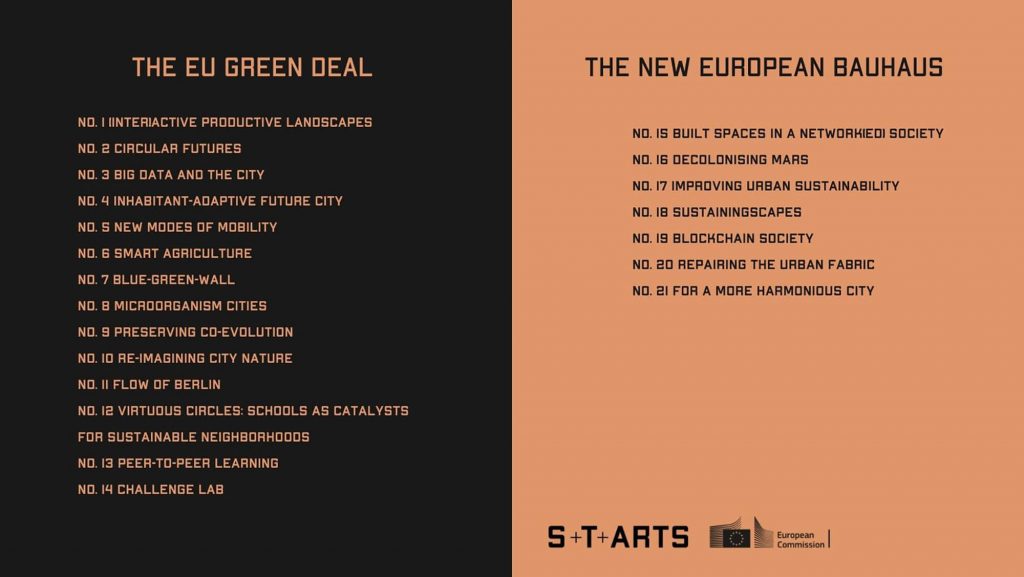
Challenge nº1: (Inter)active productive landscapes
How might digital technologies support citizens, policymakers, entrepreneurs & researchers in their ambition to create more balanced relations between nature & humans in the region of South-West Flanders?
Consortium Partner: Snowball & GLUON
EU Green Deal: GD6 Preserving and protecting biodiversity
Challenge nº2: Circular Futures
How might we catalyze circular futures by increasing social commitment to deal with our energy & resource crisis?
Consortium Partner: Ars Electronica
EU Green Deal:GD3 Industrial strategy for a clean & circular economy
Challenge nº3: Big Data and the City
How might we picture and redesign future urban mobility in the age of big data?
Consortium Partner: SONY CSL & MAXXI
EU Green Deal:GD4 Sustainable and smart mobility
Challenge nº4: Inhabitant-Adaptive Future City
How might we create adaptive cities with synergies between physical and digital public city spaces?
Consortium Partner: In4Art
EU Green Deal:GD4 Sustainable and smart mobility
Challenge nº5: New Modes of Mobility
How might we create an open-minded culture towards change and turn Berlin’s future of mobility into a collective mission?
Consortium Partner: STATE
EU Green Deal:GD4 Sustainable and smart mobility
Challenge nº6: Smart Agriculture
How might we empower rural areas as role models of sustainability & prosperity through the use of technology?
Consortium Partner: Onassis Stegi
EU Green Deal:GD5 Greening the Common Agricultural Policy / Farm to Fork Strategy
Challenge nº7: Blue-Green-Wall
How might we use ICT to better understand the processes in nature?
Consortium Partner: Kersnikova
EU Green Deal:GD5 Greening the Common Agricultural Policy / Farm to Fork Strategy
Challenge nº8: Microorganism Cities
How might we integrate microorganisms to design more sustainable cities?
Consortium Partner: CCCB
EU Green Deal: GD6 Preserving and protecting biodiversity
Challenge nº9: Preserving Co-evolution
How might we preserve the co-evolution of the species by enhancing the capacity of micro and macro communities to be resilient when challenged by diversity?
Consortium Partner: MEET
EU Green Deal:GD6 Preserving and protecting biodiversity
Challenge nº10: Re-imagining City Nature
How might we learn to live with nature in the city?
Consortium Partner: In4Art
EU Green Deal:GD6 Preserving and protecting biodiversity
Challenge nº11: Flow of Berlin
How might we rethink our relationship to Berlin-Brandenburg’s water to maintain a livable and sustainable future for all human beings, animals and ecosystems?
Consortium Partner: STATE
EU Green Deal:GD7 Towards a zero-pollution ambition for a toxic-free environment
Challenge nº12: Virtuous Circles: Schools as Catalysts for Sustainable Neighborhoods
How might we engage school communities with the practices of a circular economy both locally and globally by encouraging innovative design thinking through the use of advanced technologies, participatory creative research, storytelling, and contemporary artistic media?
Consortium Partner: Onassis Stegi
EU Green Deal:GD8 Mainstreaming sustainability in all EU policies
Challenge nº13: Peer-To-Peer Learning
How might we engage kids and young adults in informal peer-to-peer learning and learning through playing with critical use of AI technology?
Consortium Partner: Kersnikova
EU Green Deal:GD8 Mainstreaming sustainability in all EU policies
Challenge nº14: Challenge Lab
How might we ESTABLISH an attractive collaborative ENVIRONMENT for radical innovations?
Consortium Partner: Kersnikova
EU Green Deal:GD9 The EU as a global leader
Challenge nº15: Built spaces in a network(ed) society
How might we revive the built spaces with the help of digital technologies, to facilitate new sustainable and inclusive economic, social and cultural activities?
Consortium Partner: Snowball
The New European Bauhaus: BH1 Affordable & accessible living spaces through community engagement
Challenge nº16: Decolonising Mars
How might we understand space migration? What would decolonising Mars be like?
Consortium Partner: Art Hub Copenhagen
The New European Bauhaus:BH2 Sustainable living in Europe & beyond
Challenge nº17: Improving Urban Sustainability
How might we re-shape the present by sowing the seeds for a more sustainable future?
Consortium Partner: SONY CSL & MAXXI
The New European Bauhaus:BH2 Sustainable living in Europe & beyond
Challenge nº18: SustainingScapes
How might we develop innovative approaches and solutions for dealing with the tourism industry’s footprint while promoting sustainable tourism practices?
Consortium Partner: CYENS
The New European Bauhaus:BH2 Sustainable living in Europe & beyond
Challenge nº19: Blockchain Society
How might we navigate and negotiate a blockchain society?
Consortium Partner: Art Hub Copenhagen
The New European Bauhaus:BH3 Improve the quality of our lives
Challenge nº20: Repairing the Urban Fabric
How might we demonstrate that a “repaired” urban fabric could, not only be more resilient against external pathogens but also be a vector of healing and wellbeing that draws strength from social proximity and complexity?
Consortium Partner: MEET
The New European Bauhaus:BH3 Improve the quality of our lives
Challenge nº21: For a More Harmonious City
How might we create a more harmonious city?
Consortium Partner: CCCB
The New European Bauhaus:BH3 Improve the quality of our lives
Artist Info Sessions
Tackling complex issues requires a deep understanding of the potential of all actors involved. So, we designed a thorough application process to ensure the artists selected are best fitted to the challenges defined. To help artists get a better understanding of the open call we plan a live-streamed info session on the 18th of October at 17:00 CEST and 29th of October at 10:30 CEST.
During these sessions, the partners of the Regional S+T+ARTS Centres will present the new open call to give artists a better understanding of what they expect and how is the application process.
Representatives of the 12 Regional S+T+ARTS Centres, including some of Europe’s leading cultural and art institutions, innovation and cleantech hubs, will present the 21 regional challenges defined in accordance with the goals of the European Green Deal, the New European Bauhaus and their groups of local experts and show artists how to approach the application for this open call.
Fellowship Timeline
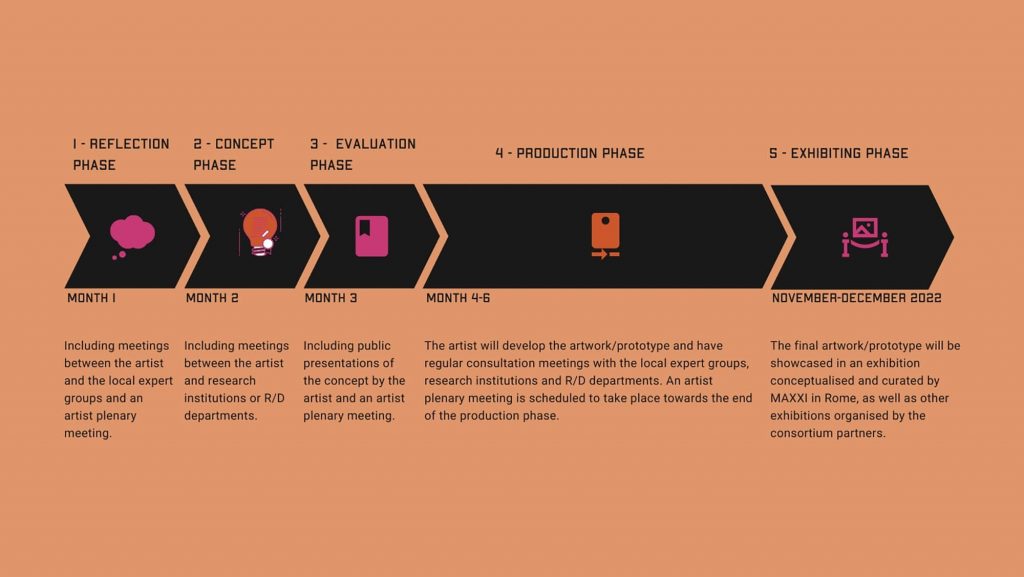
If you have questions please consult our FAQs and our Guide for Applicants.
If your questions have still not been answered, write us an email at hello@repairingthepresent.eu.


